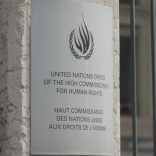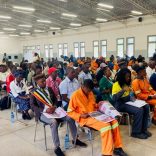Mozambique to increase power supply to Eswatini from 5 to 30 MWh
Mozambique Elections: “We are destroying what little Mozambique still has” – Ngoenha | Watch

Screen grab: Severino Ngoenha/YouTube
Philosopher and academic Severino Ngoenha recently published a video on his YouTube channel addressing the current challenges in Mozambique. With an in-depth analysis and incisive narrative, Ngoenha highlights the imminent risks of social polarization, institutional degradation and violence, warning of the dangers of the country sliding into a scenario similar to that seen in Libya, Iraq or Somalia.
Ngoenha therefore makes an urgent call for peace, social reconstruction and political consensus, focusing on the future of the country and the survival of its institutions, a reflection arising in the context of the current situation in the country – the demonstrations, electoral manipulation, police violence, popular violence, and various other evils.
Ngoenha compares the current situation in Mozambique with the most turbulent moments of the French Revolution, warning of the risk of a total collapse.
“We are killing each other, we are polarizing our society, we are destroying the little infrastructure we have. Barca would say that they destroyed France, and I say that we are destroying the little or nothing that Mozambique still has, and that is necessary for its survival. Buses, courts, institutions, schools, even party headquarters… ,” he summarises.
He emphasizes that political parties, despite all their flaws, are pillars of democracy and should not be targeted for destruction, as has happened in recent days with a Frelimo party headquarters vandalized and even set on fire during the demonstrations in favour of “electoral truth”.
The academic recognizes that Mozambique faces urgent structural challenges, but questions how to move forward without falling into a spiral of violence, with people deliberately violating each other in the name of defending a collective good.
“The drama we face is this: how to continue with the necessary reforms, how to politically change our society, how to leverage social institutions, without further resorting to the violence of war and destruction.”
He emphasizes that, although elections are imperfect and often questioned, the alternative, chaos and violence, is not a viable solution. This could open up other realities of social differentiation, increasingly endangering harmonious coexistence.
“If we continue with the violence, we will polarize the country and it will become impossible for the country to progress. It will be difficult for any government, regardless of party, to unite Mozambicans around a common goal.”
Ngoenha warns of the risks of Mozambique following the path of countries such as Haiti, the Democratic Republic of Congo and Somalia. Taking Haiti as an example, he notes that foreign police were needed in the capital in order to pacify gang activity.
He describes how the proliferation of armed groups and interference from neighbouring nations can lead to anarchy and loss of sovereignty.
“When young people, groups and some gangs take over the rule of neighbourhoods, the danger we face is that we will fall into anarchy. No country can survive seeing anarchy. This breeds destruction.”
He also raises concerns about interference from neighbouring countries such as South Africa, Malawi and others, which could act in the name of their own interests, further aggravating national instability.
One of the most worrying points raised by Ngoenha is the increase in social polarization, which he sees as an obstacle to national unity and development.
“We are witnessing the resurgence of tribalism and racism. This not only makes it difficult for all Mozambicans to mobilize to fight poverty, but it could also lead to the division of the country into two, three or four parts.”
Ngoenha also recalls that, since independence, Mozambique has always prided itself on being a single and indivisible country, something that could be called into question if the situation becomes uncontrollable.
At the end of his message, Severino Ngoenha calls for the construction of an “agreement of the brave”, which he believes is essential to avoid an even greater collapse.
“The only common victory is the peace of Mozambique, its existence and its integrity. We need to find an agreed truth, a compromise that will allow us to get out of this turbulent, confusing and deadly situation.”
To this end, Ngoenha calls for intelligence, humility and greatness from national leaders to renounce their individual truths for the sake of a greater good.
“If it is necessary to renounce one’s own part of the truth for a greater truth: that is what the greatness of a man, the greatness of politics and the greatness of a society consists of.”
However, Ngoenha reiterates that peace must be the pillar of all political and social decisions.
“Without peace, there will be no fight against poverty, development or hope for a better future. If we destroy the little we have, tomorrow we will not know how to satisfy the needs of our population,” Ngoenha concludes.













Leave a Reply
Be the First to Comment!
You must be logged in to post a comment.
You must be logged in to post a comment.